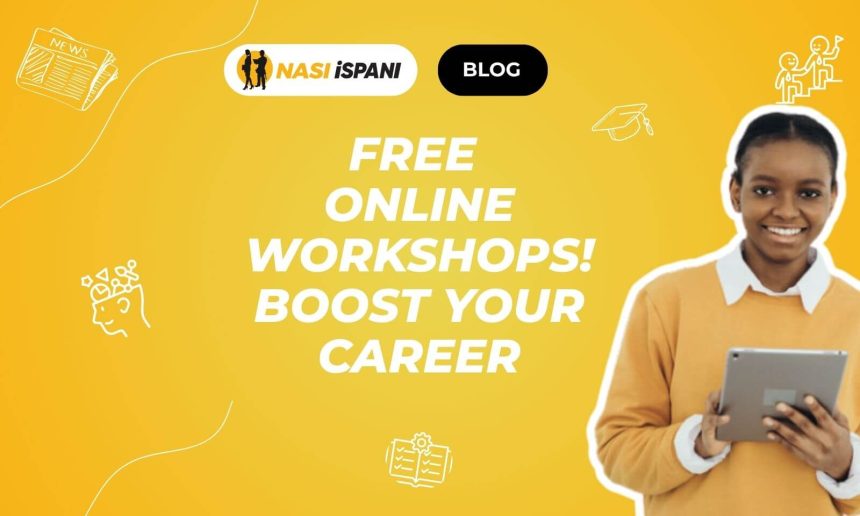South Africa’s job market is shifting fast. Employers are looking for practical, digital, and work-readiness skills that go beyond formal qualifications. The good news is that several world-leading tech companies, local training partners, and SETA-backed programmes are offering free online workshops to help you become more employable before 2026.
- Why Free Online Workshops Matter in South Africa Right Now
- What Counts as a Credible “Free Workshop”
- Best Free Online Workshops for South Africans (2025–2026)
- Sector-Focused Picks Before 2026
- SETAs, NYDA, and Public Initiatives Explained
- How to Choose the Right Workshop in 15 Minutes
- A 30–60–90 Day Learning Plan You Can Follow
- Prove Your Learning to Employers
- Avoid Common Pitfalls
These courses are not only free but also flexible, accessible via mobile, and recognised by many employers. Whether you’re a student, job seeker, or professional wanting to upskill, these platforms can give you the edge to land new opportunities in the next year.
Why Free Online Workshops Matter in South Africa Right Now
South Africa continues to face one of the highest youth unemployment rates globally, but employers repeatedly highlight one gap — skills, not talent. The Fourth Industrial Revolution (4IR) has changed what the workplace values. Data, digital literacy, and problem-solving are the new must-haves.
In response, both public and private organisations have committed to large-scale, no-cost digital upskilling. Microsoft’s “Skills for Jobs” initiative, for example, aims to train 1 million South Africans by 2026, while Google, AWS, IBM, and Cisco all offer South Africa–specific pathways to help people build in-demand skills.
In short, these programmes are your opportunity to learn fast, build credentials that employers trust, and prepare for the future job market — all from your phone or computer.
What Counts as a Credible “Free Workshop”
Not every online course that says “free” is worth your time. When choosing a workshop, consider:
- Who offers it: Look for reputable organisations (like Microsoft, Google, or SETAs).
- Certification type: Prefer courses with verifiable digital certificates or badges.
- Duration: Short courses (under 20 hours) are ideal for quick skill-building.
- Accreditation: Some SETA-linked or university-affiliated programmes may carry formal credit.
- Accessibility: Check if the platform is mobile-friendly or zero-rated (no data cost).
Avoid workshops that:
- Promise unrealistic salaries after completion.
- Require payment to “unlock” the certificate.
- Have no identifiable partners or credentials.
Best Free Online Workshops for South Africans (2025–2026)
Here’s a summary of top free programmes that build real employability:
| Platform / Programme | Focus Area | Duration | Certificate | Who It’s For |
|---|---|---|---|---|
| IBM SkillsBuild | AI, data analytics, cybersecurity | Flexible | Shareable digital badges | Beginners and career changers |
| Microsoft Learn (South Africa) | Cloud, Power Platform, data, AI | Self-paced | Microsoft credential | Students, IT professionals |
| AWS re/Start (with partners) | Cloud computing fundamentals | 12 weeks (full-time) | AWS certification support | Unemployed/underemployed youth |
| Cisco Networking Academy | Networking, Python, cybersecurity | 10–60 hours | Cisco certificate | Tech learners and students |
| Google Career Certificates | IT, UX, data analytics, project management | 3–6 months | Google certificate | Job seekers & professionals |
| Google Hustle Academy | Entrepreneurship and small business skills | 1 week bootcamp | Google & partner certificate | SMME owners |
| SAYouth.mobi | Work-readiness and job search support | Ongoing | Digital badges & referrals | Youth (18–35) |
| MICT SETA Online Programmes | ICT sector training and events | Varies | SETA-accredited | Job seekers, ICT graduates |
| NYDA-Microsoft Digital Skills Partnership | Entry-level IT & Office skills | Short courses | Verified certificate | Young job seekers |
Sector-Focused Picks Before 2026
1. Digital & AI Fundamentals
- IBM SkillsBuild: Offers structured learning paths in AI, cloud, and data. Certificates are verifiable on LinkedIn.
- Microsoft Learn: Includes courses like “AI Fundamentals” and “Data Literacy Essentials.”
- Google Digital Skills for Africa: Focuses on online marketing, data, and analytics for entrepreneurs.
2. Cloud Careers
- AWS re/Start: South African partners like Forge Academy and Serco Academy run this free, full-time programme. It prepares learners for entry-level cloud roles with job placement support.
- Microsoft Azure Fundamentals (AZ-900): Available via Microsoft Learn and offers a clear entry path into cloud careers.
3. Networking & Cybersecurity
- Cisco Networking Academy: Teaches Python, networking, and cybersecurity basics. Courses like “Introduction to Cybersecurity” are perfect for beginners.
- ISC2 Certified in Cybersecurity (Entry-level): Free self-paced course with exam voucher (when available).
4. Entrepreneurship & Small Business
- Google Hustle Academy: Focuses on building business strategy, marketing, and funding readiness. Free to qualifying South African entrepreneurs.
- Future Females Business School: Occasionally runs free digital entrepreneurship cohorts for women.
5. Work Readiness & Job Search
- SAYouth.mobi and Harambee Youth Employment Accelerator: Offer CV tips, interview practice, and links to real job opportunities.
- LinkedIn Learning (Free Access via Libraries): Some municipal libraries provide access to professional courses for free.
SETAs, NYDA, and Public Initiatives Explained
SETAs (Sector Education and Training Authorities) are government bodies that fund and monitor skills training within industries. For digital and creative careers, the MICT SETA (Media, Information, and Communication Technologies SETA) is most relevant. It frequently advertises funded programmes and events through its website and partner institutions.
The National Youth Development Agency (NYDA) collaborates with companies like Microsoft to roll out free digital literacy programmes and provide youth with access to devices and data.
Meanwhile, SAYouth.mobi (powered by Harambee) acts as a free national platform connecting youth to jobs, learnerships, and online training — no data costs on major networks.
Together, these initiatives form part of the Presidential Youth Employment Intervention (PYEI), helping bridge education and work-readiness gaps.
How to Choose the Right Workshop in 15 Minutes
Here’s a quick checklist before you commit:
- Define your goal – What job are you aiming for?
- Identify core skills – Check job ads on LinkedIn or Careers24 to see what’s in demand.
- Match skills to providers – For example, cloud skills → AWS or Microsoft; marketing → Google.
- Check recognition – Look for official certificates that can be added to your CV or LinkedIn.
- Check time & tech – Make sure the course fits your schedule and data budget.
- Verify legitimacy – Always enrol through official links (.org, .com, or .gov.za).
A 30–60–90 Day Learning Plan You Can Follow
You don’t need to quit your job or studies to upskill effectively. Here’s a realistic roadmap:
Days 1–30: Build Foundations
- Complete an entry-level course (e.g., Google Digital Skills or IBM SkillsBuild Introduction to AI).
- Join an online community or WhatsApp study group.
- Set up a LinkedIn profile if you don’t have one.
Days 31–60: Deepen Skills
- Start an intermediate module (e.g., AWS Cloud Practitioner or Microsoft Data Fundamentals).
- Build a small project — like a Power BI dashboard, website, or portfolio page.
- Share weekly progress online to stay accountable.
Days 61–90: Get Job Ready
- Complete practice assessments and earn your certificate.
- Create a digital portfolio showcasing your skills.
- Apply for learnerships or entry-level roles linked to your new skills.
Prove Your Learning to Employers
Earning a certificate is one step; showcasing it effectively is another. Here’s how to make it count:
- Add it to LinkedIn: Use the official “Add Certificate” feature with a link to verification.
- Mention it in your CV summary: Example — Certified in AWS Cloud Practitioner (2025).
- Create a mini portfolio: Include screenshots, GitHub links, or short project summaries.
- Request endorsements: Ask mentors or course facilitators for a brief LinkedIn recommendation.
- Show consistency: Stack 2–3 related micro-credentials for stronger credibility.
Avoid Common Pitfalls
Even the best learners waste time when they fall for poor-quality offers. Watch out for:
- Fake certificates: Avoid platforms that don’t verify credentials or require payment after enrolment.
- Paywalls: Legitimate free programmes never hide core content behind surprise fees.
- No completion tracking: If a course doesn’t provide progress tracking or final assessments, it’s not employer-grade.
- No real-world link: Choose programmes that include projects, quizzes, or mentorship.
Tip: Always use the official sites (for example, skillsbuild.org, learn.microsoft.com, or sayouth.mobi).
Also check: Can Your Internship Lead to a Permanent Job? Here’s How to Make It Happen
If you’re serious about improving your career prospects before 2026, free online workshops are one of the smartest and most affordable ways to do it. Focus on credible providers, stack certificates strategically, and showcase your progress online.
The digital economy rewards visible skills — not just degrees. Take advantage of these free resources, stay consistent, and you’ll be better prepared for South Africa’s evolving job market.



